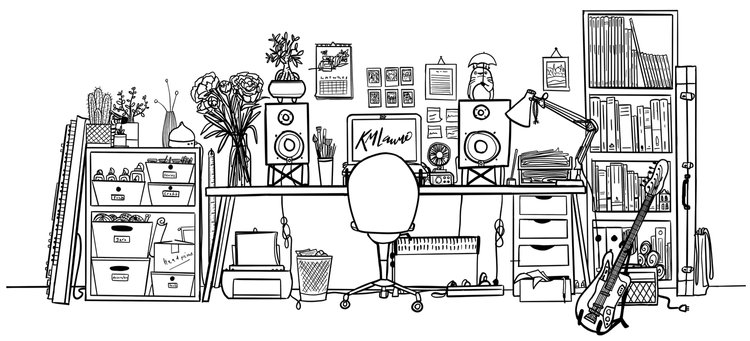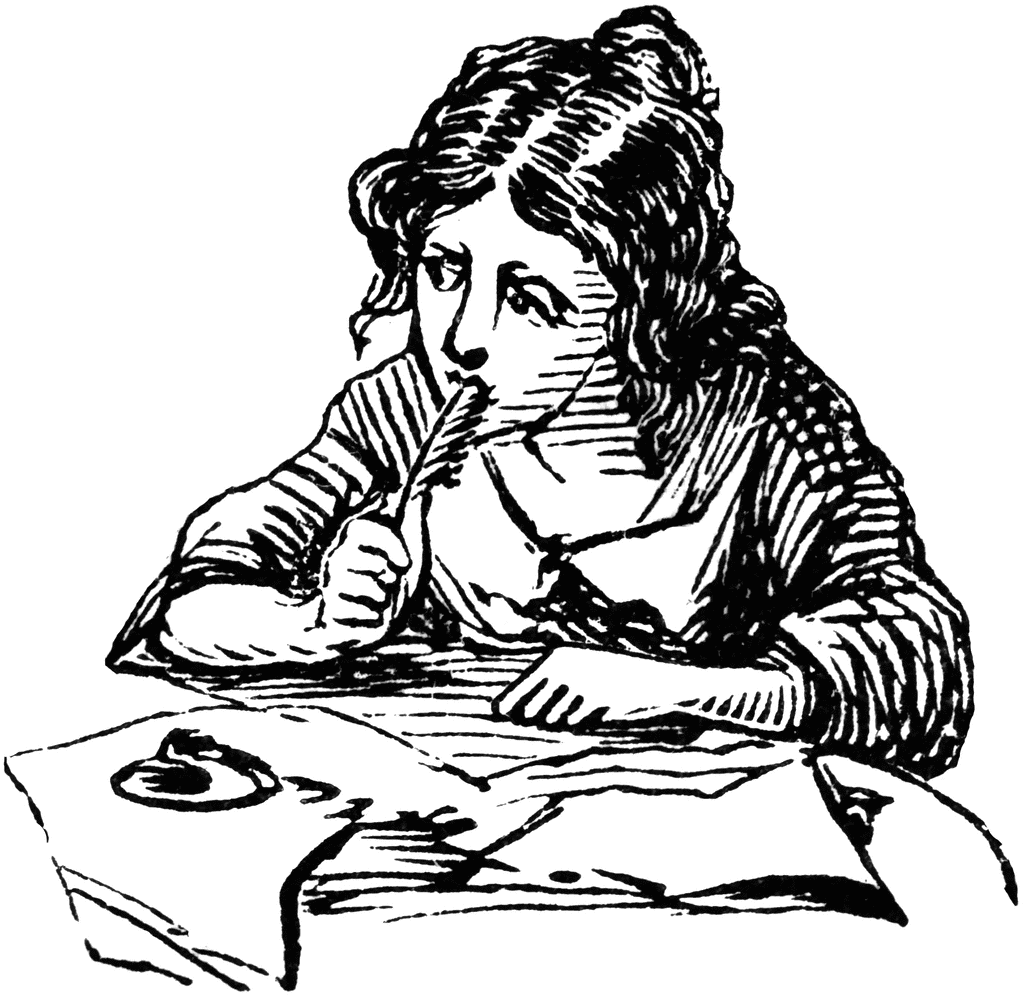Source: Harper's New Monthly Magazine (New York, NY: Harper & Brothers, 1871)
It’s such a joy for me to write, it’s a wonder why I avoid it so often. As the biblical Jonah runs away from his calling, as he literally (but still of course, figuratively) takes to the high seas, I busy myself looking for inspiration, content, and other such things (not that they are in themselves necessarily bad) and I so often ignore the actual craft. Under careful analysis I think it is partially a fear of committing words to paper forever more so that even if my ideas evolve the ‘captains log’ of ideas remains. And it’s partially the fear of it not being good enough and the criticisms and critiques it will inevitably bring, as well as the commitment to this potentially foolish endeavour of becoming an author.
So I run and I distract myself, but I know that I have to eventually take it upon myself to regularly make that courageous plunge into the bellies of the metaphorical beasts lurking in the depths of my very being. As George Orwell put it on the very first page of his On Why I Write (which sits framed on my desk, the rest of the book having been demoted to a dusty shelf somewhere):
Between the ages of about seventeen and twenty-four I tried to abandon this idea [of becoming a writer], but I did so with the consciousness that I was outraging my true nature and that sooner or later I should have to settle down and write books.
And indeed Mark Haddon (of The Curious Incident of the Dog in the Night-Time fame) wrote:
I don’t remember deciding to become a writer. You decide to become a dentist or postman. For me writing is like being gay, you finally admit that this is who you are, you come out and hope that no one runs away.
And of course I’ve never fully neglected my authorial side, as I have spent many an hour perfecting lyrics and poetry. But lyrics, although they can be brave, honest, and raw, also tend to hide behind a wall of sweet, syrupy, diverting music and a danceable beat. As for poetry, that generally sits in a drawer as I hold a paradoxical and secretive loathing (and by extension, shame) of poetry, though I enjoy many of the great poets’ works. See, paradoxical.
However, bubbling away in me are hundreds of threads of stories, worlds, characters and their partially formulated conflicts and achievements (as according to etymological enthusiast Mark Forsyth, the word text was born from texture and textiles, thus it is inextricably linked up with thread as words must be woven together to create stories and sensical language, or in Katherine Mansfield’s case, which I mention later, embroidered). And that’s only the tip of the iceberg, as like a greedy sea sponge plucked from the seabed I collect words, phrases, idioms, ideas, names, observations, conversations, terminologies, techniques, literary references, and a whole host of random information about unrelated fields that pique my interest. No wonder my brain tips towards the chaotic, it’s disorganised mayhem in there. Therefore, if I continue to coast along absentmindedly the whole mess of it may fester away into some formidable creature. As author Kathy Acker wrote: “I write it to get it out of me.” And I’m the sort of person that has all these writers’ quotes written on colourful post-it notes dotted around my workspace, urging me to get to it - come what may!
Though the biggest roadblock (with the exception of writing for days and never stopping, jumping from project to project and completely overwhelming myself, as it is all consuming for me [i.e. this article took me five hours to write while my breakfast and tea went stone cold]) is self-doubt. Doubt that I’m not smart enough, that I don’t know enough - because its impossible to know everything, and doubt that I’ll get even the most basic things wrong (which I undoubtably will as I am human, thus I err, and I’m a dyslexic one at that). I doubt that I’m any good at what I do, doubt that it will ever bring success, doubt that it will even be worthwhile for people to spend their precious time and money on what I create. So. Many. Doubts. As Sylvia Plath wrote, “The greatest enemy to creativity is self-doubt.” She herself was plagued with doubts. She lived with and was married to another poet, who at the time was arguably more successful than her. What enormous pressure. She was acutely aware of self-doubt holding her back.
I am often filled with dread and self-doubt when around my fellow creatives, though love them as I do. Even the thought of joining a writers workshop to ‘meet like minded people’ terrifies me, as it means I inevitably begin to compare myself. I do think it is an automatic and perhaps evolutionary response. Sometimes if one can’t make peace with it, one needs to take a step back, as I often do when overwhelmed by the talents and successes of others. Though I wish I didn’t have to. Sometimes I even become envious. But lately, I use envy as an indicator of underlying goals that I must want to achieve. I try to repurpose my envies to be useful to me rather than hateful or toxic.
To be highly creative is to teeter at the edge of a cliff naked, for all to see. To have your very reason for being, your character, and your deeply personal creations open for public scrutiny and reticule. Other jobs don’t have the same persistent level of publicised and perfectly acceptable scrutiny. So what do brave creatives suggest? Don’t read comments. Ever. Especially public ones. But what a shame, as one misses so much wonderful (and much needed) encouragement and praise.
Despite best attempts not every creative processes the temperament for developing a tough skin to protect from all the criticism. Though, I recently came to the conclusion that some of the most hurtful, lingering criticism can be that which contains a kernel of truth, a difficult truth which is hard to face and accept, or at the very least, a perceived truth that perhaps deep down you believe even though it’s not true. Aren’t we wonderfully complicated? So criticism and dislike can be very hard to take.
As Stephan Fry illustrated in a recent interview, most people will jump out of a lovely, cool, refreshing swimming pool if it has even the smallest piece of poop floating in it, despite the rest of the water being utterly delightful. So I suppose it is best to be that person who floating on their back, blissfully ignorant to the fact everyone else has fled the tainted aqua box. Don’t look for the poop, don’t read the comments. Or if you are of strong mind, fell free to jump back on in. Generally though, many of us creatives are of a more sensitive disposition, being that is part of what makes us so creative to begin with, but more on that another time.
I think the best cure is to read accounts of other honest creatives who openly discuss their doubts, difficulties, insecurities, and bouts of imposter syndrome (like I suppose I’m trying to do here).
The other day I picked up a 1936 edition of The Journal of Katherine Mansfield (fellow New Zealand writer) and was strangely encouraged to read some of the following entries (I do hope these extracts are context appropriate):
March 31
I can do nothing and I feel wretched. Life is a hateful business, there’s no denying it.
April 2
I’ve decided to tear up everything that I’ve written and start again….It’s the
continual effort – the slow building up of my idea and then, before my eyes
and out of my power, its slow dissolving.
April 4
I am so terrified of writing mockery for satire that my pen hovers and won’t settle.
April 6
My mind is so full of embroidery, but there isn’t any material to make it strong. A silly state!
May
Oh, if only I could make a celebration and do a bit of writing. I long and long to write, and the words just won’t come.
November 15
…the book to be written is still unwritten. I can’t just sit down and fire away like J.
January 1
What a vile little diary! But I am determined to keep it this year. For this year I have two wishes: to write, to make money. Consider. With money we could go away as we liked, have a room in London, be as free as we liked, and be independent and proud with nobodies. It is only poverty that holds us so tightly. Well J. doesn’t want money and won’t earn money. I must. How? First get this book finished. That’s a start. When? At the end of January. If you do that you are saved. If I wrote night and day I could do it. Yes, I could. Right O! I feel the new life coming nearer. I believe, just as I always have believed. Yes, it will come. All will be well.
[Next day…]
January 2
A horrible morning and afternoon. Je ne me sens incapable de tout, and at the same time I am just not writing very well. I must finish my story to-morrow. I ought to work at it all day, - yes, all day and into the night if necessary. A vile day. J’ai envie de prier au bon Dieu comme le vieux père Tolstoi. Oh, Lord, make me a better creature to-morrow. Le Coeur me monte aux levers d’un goût de sang. Je me deteste aujourd’hui.
And so on, and so on….
So she goes from feeling determined and positive one day, to incapable and hateful towards her self the very next. Her journal shows me that these feelings and doubts are normal, even for the successful (just as failure is too). This is only one of many examples of the ‘creative curse’, as I tend to call it. This thrilling and daunting path however can’t be long avoided, nor it’s pull suppressed. Eventually one must give over to it completely, or risk the monstrous consequences.
So, I leave you with the immortal words of Charlotte Brontë, whose parsonage home I was very lucky to visit earlier in the year:
I’m going to write because I cannot help it.

